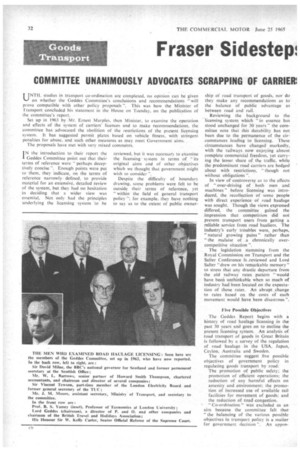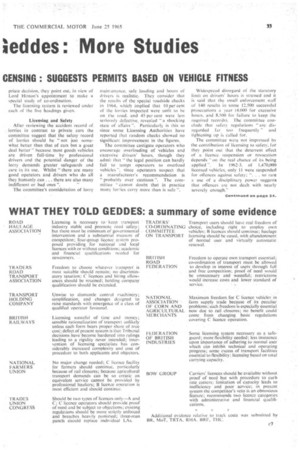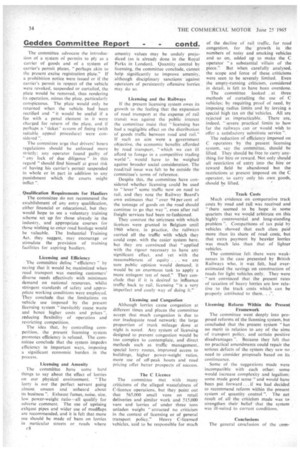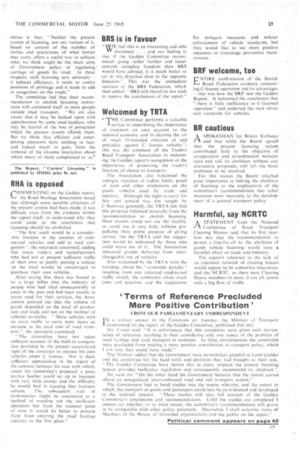Fraser Sidestep! ileddes: More Studies
Page 34

Page 35

Page 36

Page 37

If you've noticed an error in this article please click here to report it so we can fix it.
COMMITTEE UNANIMOUSLY ADVOCATES SCRAPPING OF CARRIER; CENSING : SUGGESTS PERMITS BASED ON VEHICLE FITNESS
UINT1L studies in transport co-ordination are completed, no opinion can be given ‘...) on whether the Geddes Committee's conclusions and recommendations " will prove compatible with other policy proposals". This was how the Minister of Transport concluded his statement in the House on Tuesday, on the publication of the committee's report.
Set up in 1963 by Mr. Ernest Marples. then Minister, to examine the operation and effects of the system of carriers' licences and to make recommendations, the committee has advocated the abolition of the restrictions of the present licensing system. It has suggested permit plates based on vehicle fitness, with stringent penalties for abuse, and such other measures as may meet Government aims.
The proposals have met with very mixed comments.
I N the introduction to their report the Geddes Committee point out that their terms of reference were " perhaps deceptive!), concise ". Enough points were put to them, they indicate, on the terms of reference narrowlydefined, to provide material for an extensive, detailed review of the system, but they had no hesitation in deciding that a wider view was essential. Not only had the principles underlying the licensing system to be
reviewed, but it was necessary to examine the licensing system in terms of " its original aims and of other objectives which we thought that government might wish to consider ".
Despite the difficulty of boundary drawing, some problems were felt to be outside their terms of reference, yet "within the field of general transport policy "; for example. they have nothing to say as to the extent of public owner
ship of road transport of goods, nor do they make any recommendations as to the balance of public advantage as between road and rail.
Reviewing the background to the licensing system which "iii essence has stood unchanged for 30 years" the committee note that this durability has not been due to the permanence of the circumstances leading to licensing. These circumstances have changed markedly, with the railways now enjoying almost complete commercial freedom, yet carrying the lesser share of the traffic. while the predominant road carriers are hedged about with restrictions, "though not without obligations ".
In view of controversy as to the effects of "over-driving of both men and machines" before licensing was introduced, the recollection of some people with direct experience of road haulage was sought. Though the views expressed differed, the committee gained the impression that competition did not prevent transport users from getting a reliable service from road hauliers. The industry's early troubles were, perhaps, "natural growing pains" rather than "the malaise of . a chronically overcompetitive situation".
The legislation stemming from the Royal Commission on Transport and the Salter Conference is .reviewed and Lord Salter "drew on his remarkable memory" to stress that any drastic departure from the old railway rates pattern "would have been unthinkable when so much of industry had been located on the expectation of those rates. An abrupt ,change to rates based on the costs of each movement would have been disastrous".
Five Possible Objectives The Geddes Report begins with a history of road haulage licensing in the past 30 years and goes on to outline the present licensing system. An analysis of road transport of goods in Great Britain is followed by a survey of the regulation of road haulage in the USA. Japan, Ceylon, Australia and Sweden.
The committee suggest five possible objectives of government policy in regulating goods transport by road: The promotion of public safety; the promotion of efficient operations; the reduction of any harmful effects on amenity and environment; the promotion of increased use of available rail facilities for movement of goods; and the reduction of road congestion.
"Co-ordination" was excluded as an aim because the committee felt that "the balancing of the various possible objectives in transport policy is a matter for government decision ". An appro priate decision, they point out, in view of Lord Hinton's appointment to make a special study of co-ordination.
The licensing system is reviewed under each of the five headings given.
Licensing and Safety After reviewing the accident -record of lorries in contrast to private cars the committee suggest that the safety -record of lorries should he " not just somewhat better than that of cars but a great deal better because most goods vehicles are driven full-time by professional drivers and the potential danger of the lorry demands greater safeguards and care in its use. Whilst " there are many good operators and drivers who do all they humanly can ... there are also many indifferent or bad ones ".
The committee's consideration of lorry maintenance, safe loading and hours of drivers is realistic. They consider that the results of the special roadside checks in 1964, which implied that 10 per cent of the lorries inspected were unfit to be on the road. and 45 per cent were less seriously defective, revealed " a shocking State of affairs ". Particularly is this so since some Licensing Authorities have reported that random checks showed no significant improvement in the figures.
The committee castigate operators who encourage overloading of vehicles and excessive drivers' hours, though they admit that " the legal position can hardly fail to tempt . operators to overload vehicles '', since operators suspect that a manufacturer's recommendation is " probably over cautious". The committee "cannot doubt that in practice many lorries carry more than is safe ". Widespread disregard of the statutory limit on drivers' hours is stressed and it is said that the srnalf enforcement_ staff of 140 results in some 12,500 successful prosecutions a year (4,000 for excessive hours, and 8,500 for failure to keep the required records). The committee conclude that safety regulations "arc disregarded . far too frequently " and tightening up is called for.
The committee were not impressed by the contribution of licensing to safety', for they point out that the deterrent effect of a licence suspension or revocation depends " on the real chance of its being applied ". In 1962-3, . of 1,470,000 licensed vehicles, only 11 were suspended for offences against safety; ". . so rare a use of a disciplinary power suggests that offences arc not dealt with nearly severely enough."
The committee advocate the introduction of a system of permits to ply as a carrier of goods and of a system of carrier's permit plates, "perhaps akin to the present excise registration plate." If a prohibition notice were issued or if the carrier's permit in respect of the vehicle were revoked, suspended or curtailed, the plate would he removed, thus rendering its operation, minus the plate. particularly conspicuous. The plate would only be returned when the vehicle had been rectified and "it would be useful if a fee with a penal element in it were charged for return of the plate, and if perhaps a ' ticket ' system of fining (with suitable appeal procedure) were considered ".
The committee urge that drivers' hours regulations should be enforced more strictly: any operator found guilty of "any lack of due diligence" in this regard "should find himself at great risk of having his carrier's permit suspended in whole or in part in addition to any punishment which the courts might inflict ".
Qualification Requirements for Hauliers
The committee do not recommend the establishment of any entry qualification, either financial or educational, but they would hope to see a voluntary training scheme set up for those already in the industry, and appropriate courses for those wishing to enter road haulage would be valuable. The Industrial Training Act, they suggest, may encourage or stimulate the provision of training facilities for aspiring hauliers.
Licensing and Efficiency The committee define " efficiency " by saying that it would be, maximized when road transport was meeting customers' diverse needs effectively with minimum demand on national resources, whilst stringent standards of safety and appropriate working conditions were employed. They conclude that the limitations on vehicle use imposed by the present licensing system "inevitably cause waste and hence higher costs and prices ". reducing flexibility of operation and restricting competition.
The idea that, by controlling competition, the present licensing system promotes efficiency is refuted. The committee conclude that the system impedes efficiency in important ways, imposing a significant economic burden in the process.
Licensing and Amenity
The committee have some hard things to say about the effect of lorries on our physical environment. "The lorry is not the perfect servant going almost unseen and unheard about its business". Exhaust fumes, noise, size, low. power-weight ratio—all qualify for adverse comment. The use of uprising exhaust pipes and wider use of mudflaps are recommended, and it is felt that more use should be made of bans on lorries in particular streets or roads where
c8
amenity values may be unduly prejudiced (as is already done in the Royal Parks in London). Quantity control by licensing, the committee conclude, cannot help significantly to improve amenity, although disciplinary sanctions against operators of persistently offensive lorries may do so.
Licensing and 1he Railways If the present licensing system owes its growth to the feeling that the expansion of road transport at the expense of rail transit was against the public interest the committee insist that " licensing has had a negligible effect on the distribution of goods traffic between road and rail." If such an aim were a government objective, the economic benefits afforded by road transport, "which we can ill afford to forego in a competitive trading world ". would have to be weighed against broader social consideration. The road/rail issue was felt to be outside the committee's terms of reference.
Despite this, the committee have considered whether licensing could be used to "lever" some traffic now on road to rail, and they note the Railway Board's own estimates that "over 94 per cent of the tonnage of goods on the road should continue to go that way ", even after rail freight services had been re-fashioned.
They contrast the strictness with which licences were granted in Belgium until 1960 where, in practice, the railways carried all the traffic with which they could cope, with the easier system here. but they are convinced that "applied with the rigour necessary to have any significant effect, and yet with the reasonableness of equity . . we are sure public opinion would demand, it would be an enormous task to apply a more stringent test of need." They conclude that if it is desired to influence traffic back to rail, licensing "is a very imperfect and costly way of doing it."
Licensing and Congestion Although lorries cause congestion at different times and places the committee accept that much congestion is due to our inadequate road network; the large proportion of trunk mileage done at night is noted. Any system of licensing designed to prevent congestion would be too complex to contemplate, and direct methods such as traffic management, special lorry routes. improved access to buildings, higher power-weight ratios. more use of off-peak hours and road pricing offer better prospects of success.
The C Licence
The committee met with many criticisms of the alleged wastefulness of C-licence operations, but they point out that 565.000 small vans on retail deliveries and similar work and 515,000 vans and lorries of under three tons unladen weight "attracted no criticism in the context of licensing or of general transport policy." Heavy C-licensed vehicles, said to be responsible for much of the decline of rail traffic, for road congestion, for the growth in the numbers of noisy and smoking vehicles and so on, added up to make the C operator "a substantial villain of the piece." But When carefully analysed, the scope and force of these criticisms were seen to be severely limited. Even the empty-running criticism, considered in detail, is felt to have been overdone.
The committee looked at three methods of curtailing the use of C vehicles: by requiring proof of need, by imposing radius limits and by levying a special high tax on the vehicles. All are rejected as impracticable. There arc, indeed, "severe practical limits to how far the railways can or would wish to offer a satisfactory substitute service ".
The reduction of efficiency imposed on C operators by the present licensing system, say the committee, should be lifted. They should be free to carry anything for hire or reward. Not only should all restriction of entry into the hire or reward field be abandoned but the restrictions at present imposed on the C operator, to carry only his own goods, should be lifted.
Track Costs
Much evidence on comparative track costs by road and rail was received and "there seemed to be hope in some quarters that we would arbitrate on this highly controversial and long-standing problem ". Comparisons of tax paid by vehicles showed that each class paid more than its share of road costs, but that extra payment by heavier lorries was much less than that of lighter vehicles.
The committee felt there were weaknesses in the case presented by British Railways who, it was felt, had overestimated the savings on construction of roads for light vehicles only. They were " not convinced that the present rates of taxation of heavy lorries are low relative to the track costs which can be properly attributed to them. . .".
Licensing Reform Within the Present Framework
The committee went deeply into proposed reforms of the licensing system, but concluded that the present system "has no merit in relation to any of the aims of transport policy, and certain positive
disadvantages Because they felt that no practical amendments could repair the serious defects of the system they saw no . need to consider proposals based on its continuance.
Some of the suggestions made were incompatible with each other: some would increase complexity and legalism; some made good sense "and would have been put forward ... if we had decided to recommend reform within the present system of quantity control ". The net result of all the criticism made was to strengthen their belief that the system was ill-suited to current conditions.
Conclusions The general conclusion of the corn mince is that "Neither the present system of licensing, nor any variant of it, based on control of the number of lorries and restrictions of what lorries may carry, offers a useful way to achieve what we think might; be the main aims of Government palicy ; regulating carriage of goods by road. In thee respects, such licensing acts adverselyit reduces efficiency, it tends to confer positions of privilege and it tends to add to congestion on 'the roads."
The committee feel that their recommendation to abolish licensing restrictions will commend itself to most people outside road transport. We arc also aware that it may be looked upon with apprehension by some road hauliers, who may be fearful of the loss of protection which the present system 'affords ,them. But we think that efficient and enterprising operators have nothing to fear. and indeed much to gain, from the removal of the irksome restriction about which many of them complained to us."




























































































































